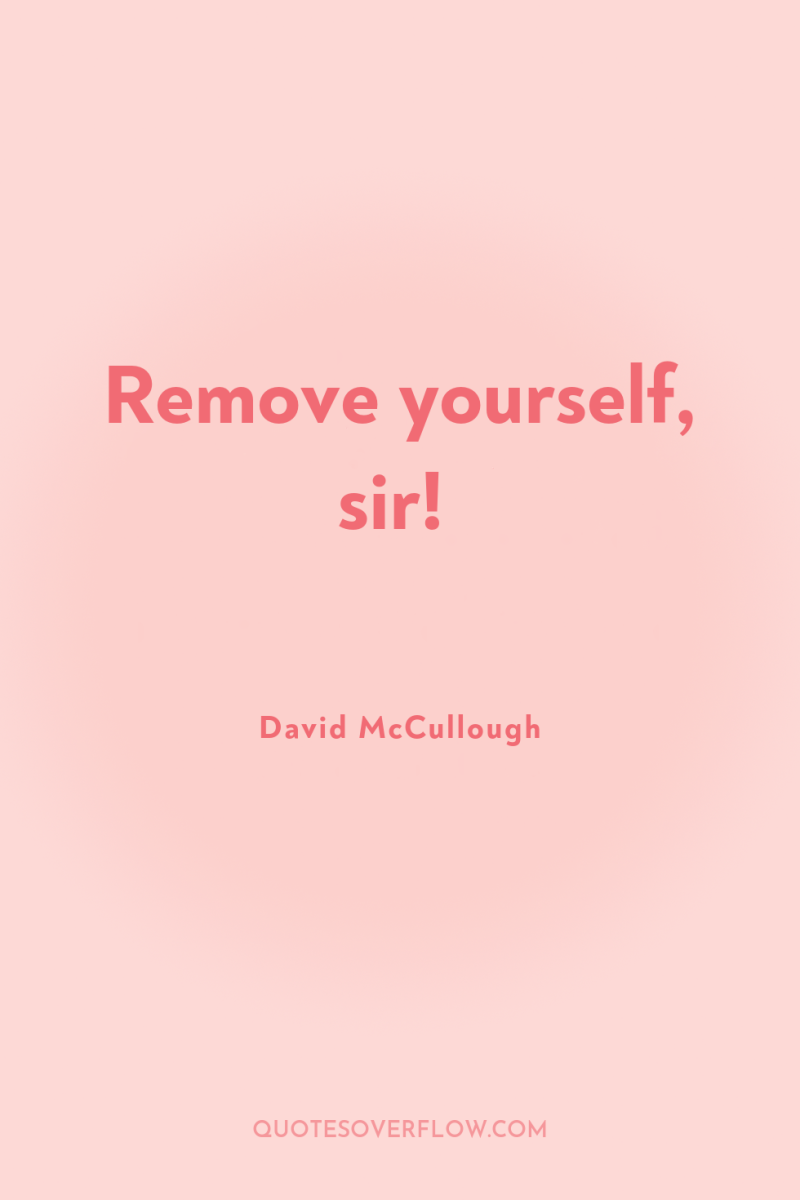
1
Give me liberty or give me death.".]Patrick Henry

2
Remove yourself, sir!David McCullough

3
Give me liberty or give me dPatrick Henry
4
Sentimentality was used because other political avenues were closed, and authors hoped that through it they could bring about a political change that would fulfill the egalitarian promises of the Revolution. Real political venues were unavailable, so fiction became a medium for authors to appeal to audiences for change.Todd M. Brenneman
5
Slavery was immensely profitable to some masters. James Madison told a British visitor shortly after the American Revolution that he could make 257 dollars on every (black slave) in a year, and spend only 12 or 13 dollars on his keep.Howard Zinn
6
Loving, of enemies is another dogma of feigned morality, and has besides no meaning. It is incumbent on man, as a moralist, that he does not revenge an injury; and it is equally as good in a political sense, for there is no end to retaliation; each retaliates on the other, and calls it justice: but to love in proportion to the injury, if it could be done, would be to offer a premium for a crime. Besides, the word enemies is too vague and general to be used in a moral maxim, which ought always to be clear and defined, like a proverb. If a man be the enemy of another from mistake and prejudice, as in the case of religious opinions, and sometimes in politics, that man is different to an enemy at heart with a criminal intention; and it is incumbent upon us, and it contributes also to our own tranquillity, that we put the best construction upon a thing that it will bear. But even this erroneous motive in him makes no motive for love on the other part; and to say that we can love voluntarily, and without a motive, is morally and physically impossible. Morality is injured by prescribing to it duties that, in the first place, are impossible to be performed, and if they could be would be productive of evil; or, as before said, be premiums for crime. The maxim of doing as we would be done unto does not include this strange doctrine of loving enemies; for no man expects to be loved himself for his crime or for his enmity. Those who preach this doctrine of loving their enemies, are in general the greatest persecutors, and they act consistently by so doing; for the doctrine is hypocritical, and it is natural that hypocrisy should act the reverse of what it preaches. For my own part, I disown the doctrine, and consider it as a feigned or fabulous morality; yet the man does not exist that can say I have persecuted him, or any man, or any set of men, either in the American Revolution, or in the French Revolution; or that I have, in any case, returned evil for evil.Thomas Paine
7
When the government violates the people's rights, insurrection is, for the people and for each portion of the people, the most sacred of the rights and the most indispensible of duties.Marquis De Lafayette
8
Let a crown be placed thereon, by which the world may know, that so far as we approve of monarcy, that in America the law is King. For as in absolute governments the King is law, so in free countries the law ought to be King; and there ought to be no other.Thomas Paine
9
In questions of power, let no more be heard of confidence in man, but bind him down from mischief by the chains of the constitution.Thomas Jefferson
10
FUCK UNITY! FUCK CONSENSUS! There was no unity or consensus during the American Revolution. We had principled leadership from a small, vocal, minority that refused to compromise on the issue of individual liberty.A.E. Samaan
11
Some that read this book will find its Libertarian and Constitutionalist slant a bit obtuse and maybe even off-putting. This author makes no apologies for viewing the history of the eugenics movement from this political perspective. It is the ethical and legal underpinnings of the American Revolution that remain as a guiding light while the eugenics movement continues to reemerge long after its alleged demise. Limited, or rather minimal government, goes a long way to curtail the disconnect that emerges when government grows so large that it no longer feels compelled to heed to the dictates of the governed. .A.E. Samaan
12
The U.S. didn't achieve its liberty or prosperity by mistake. It was by design, and the architects were the Founding Fathers. Don't mess with the Constitution. The Constitution matters.A.E. Samaan
13
Humanity has won its battle. Liberty now has a country.Marquis De Lafayette
14
True republicanism is the sovereignty of the people. There are natural and imprescriptible rights which an entire nation has no right to violate.Marquis De Lafayette
15
For the primary goal of the American Revolution which transferred American life and introduced a new era in human history, was not the overthrow or even the alteration of the existing social order but the preservation of political liberty threatened by the apparent corruption of the constitution, and the establishment in principle of the existing conditions of liberty.Bernard Bailyn
16
New Englanders began the Revolution not to institute reforms and changes in the order of things, but to save the institutions and customs that already had become old and venerable with them; and were new only to a few stupid Englishmen a hundred and fifty years behind the times.Edward Pearson Pressey
17
Change represents the real spirit of democracy and the real America.Bryant McGill
18
Antislavery idealists might prefer to live in some better world, which like all such places was too good to be true. The American nation in 1790, however, was a real world, laden with legacies like slavery, and therefore too true to be good.Joseph J. Ellis
19
The idea of labor, of hard work, leading to increased productivity was so novel, so radical, in the overall span of Western history that most ordinary people, most of those who labored, could scarcely believe what was happening to them. Labor had been so long thought to be the natural and inevitable consequence of necessity and poverty that most people still associated it with slavery and servitude. Therefore any possibility of oppression, any threat to the colonists' hard earned prosperity, any hint of reducing them to the povery of other nations, was especially frightening; for it seemed likely to slide them back into the traditional status of servants or slaves, into the older world where labor was merely a painful necessity and not a source of prosperity.Gordon S. Wood